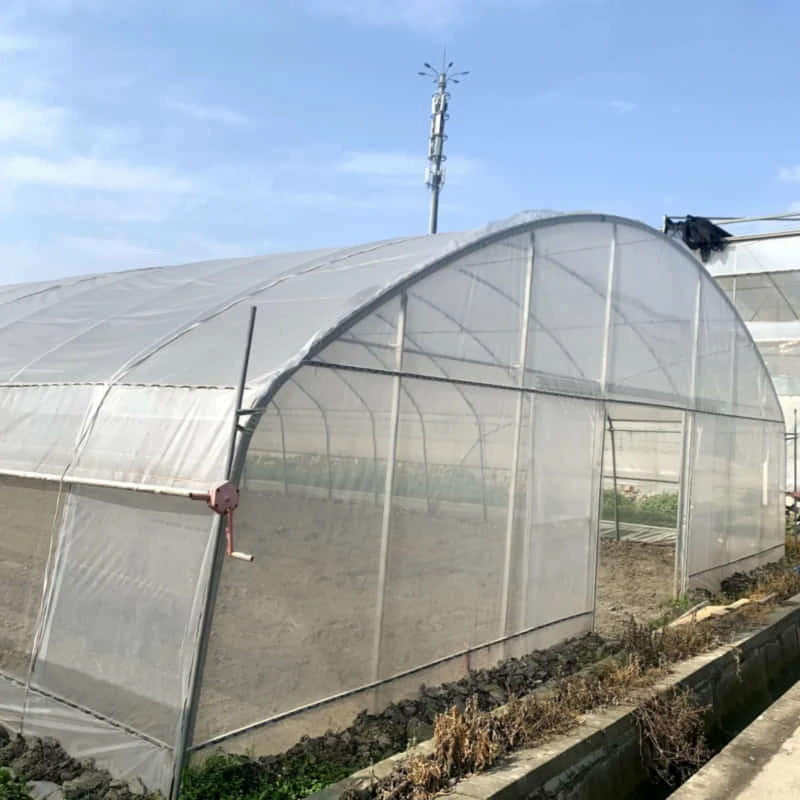When judging the quality of plastic greenhouse film, several factors should be considered.
Here are some key aspects to assess:
- Light Transmission: High-quality greenhouse film should allow sufficient light transmission to support plant growth. Look for films with high light transmittance percentages, ideally above 90% or as per the specific requirements of the crops you plan to grow. Films with good light diffusion properties can help distribute light evenly, reducing shadows and promoting uniform plant growth.
- Durability and Strength: Evaluate the durability and strength of the greenhouse film by considering its thickness and tear resistance. Thicker films, typically measured in mils (thousandths of an inch) or microns, tend to be stronger and more resistant to damage from wind, hail, or handling. Look for films with adequate tear strength to withstand stress and potential punctures.
- UV Stabilization: Greenhouse films should be UV stabilized to protect plants from harmful ultraviolet (UV) radiation. UV stabilization prevents the film from degrading and becoming brittle over time. Look for films with UV inhibitors or coatings that provide long-lasting protection against UV rays.
- Heat Retention and Insulation: Evaluate the thermal properties of the greenhouse film, particularly its ability to retain heat and provide insulation. Films with good heat retention properties can help maintain optimal temperatures within the greenhouse, reducing heating costs. Look for films with infrared (IR) additives or coatings that help trap heat inside the structure.
- Anti-Condensation Properties: Condensation can form on the inner surface of the greenhouse film, potentially causing water droplets to fall onto the plants. Anti-condensation films are designed to minimize condensation formation and prevent water droplets from dripping onto the plants. Consider films with anti-condensation properties if condensation control is important in your greenhouse.
- Anti-Drip Coating: Some high-quality greenhouse films feature an anti-drip coating. This coating helps prevent the formation of large water droplets on the film surface, reducing the risk of water dripping onto the plants. Anti-drip films can help maintain a drier environment within the greenhouse, minimizing disease incidence and improving light transmission.
- Longevity and Warranty: Consider the expected lifespan of the greenhouse film and any warranty provided by the manufacturer. High-quality films are designed to withstand prolonged exposure to environmental conditions and offer longer lifespans. Manufacturers often provide warranties that indicate their confidence in the film’s durability and performance.
- Cost-effectiveness: While quality is crucial, it’s also essential to consider the cost-effectiveness of the greenhouse film. Compare the price of the film with its expected lifespan, performance, and suitability for your specific needs. Opting for a slightly more expensive, high-quality film can provide better long-term value and performance.
When selecting plastic greenhouse film, it’s advisable to consult with reputable suppliers or manufacturers who can provide detailed information about the film’s specifications, performance characteristics, and suitability for your specific greenhouse requirements.
Are there any specific factors I should consider when choosing a greenhouse film supplier?
When choosing a greenhouse film supplier, there are several factors to consider to ensure you make an informed decision. Here are some specific factors to keep in mind:
- Reputation and Experience: Look for suppliers with a good reputation and a track record of providing high-quality products and services. Consider their experience in the industry and how long they have been supplying greenhouse films. Established suppliers with a positive reputation are more likely to offer reliable products and customer support.
- Product Quality and Specifications: Evaluate the quality of the greenhouse films offered by the supplier. Consider factors such as light transmission, durability, tear resistance, UV stabilization, heat retention, and any other specific properties that are important for your greenhouse needs. Ensure that the supplier’s films meet your specific requirements and are suitable for the crops and climate in your region.
- Range of Products: Check if the supplier offers a diverse range of greenhouse films to choose from. Having options allows you to select the film that best matches your needs in terms of thickness, light transmission, insulation properties, and other factors. A supplier with a comprehensive product range can better cater to your specific requirements.
- Customer Support: Consider the level of customer support provided by the supplier. Will they assist you in selecting the right film for your needs? Do they provide technical guidance or offer advice on installation and maintenance? Suppliers that offer reliable customer support can be valuable partners throughout your greenhouse project.
- Pricing and Value: Compare the pricing of greenhouse films from different suppliers, considering factors such as film quality, specifications, and additional services offered. While cost is important, prioritize value over the lowest price alone. Consider the overall quality, durability, and longevity of the film, as well as any warranties or guarantees provided by the supplier.
- Availability and Timely Delivery: Ensure that the supplier can meet your required quantity and delivery timeline. Timely delivery of the greenhouse film is crucial to avoid project delays. Check if the supplier has the capacity to fulfill your orders efficiently and has a reliable distribution network.
- References and Reviews: Seek references or reviews from other customers who have worked with the supplier. This can provide insights into their experience with the supplier’s products, services, and overall satisfaction. Online reviews, testimonials, or seeking recommendations from trusted sources can assist in assessing the supplier’s reputation.
- Sustainability Considerations: If environmental sustainability is important to you, inquire about the supplier’s commitment to eco-friendly practices. Look for suppliers who prioritize sustainable manufacturing processes, recycling initiatives, or the use of recycled materials in their films.
By considering these factors, you can make a more informed decision when selecting a greenhouse film supplier that aligns with your specific needs, ensuring a smooth and successful greenhouse project.
